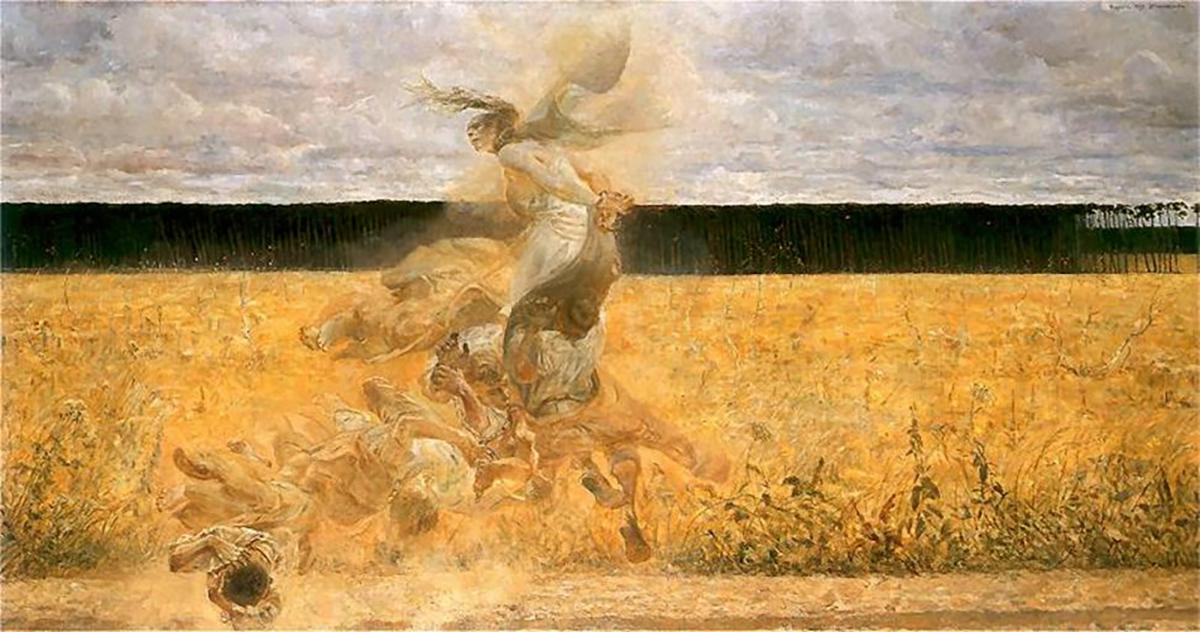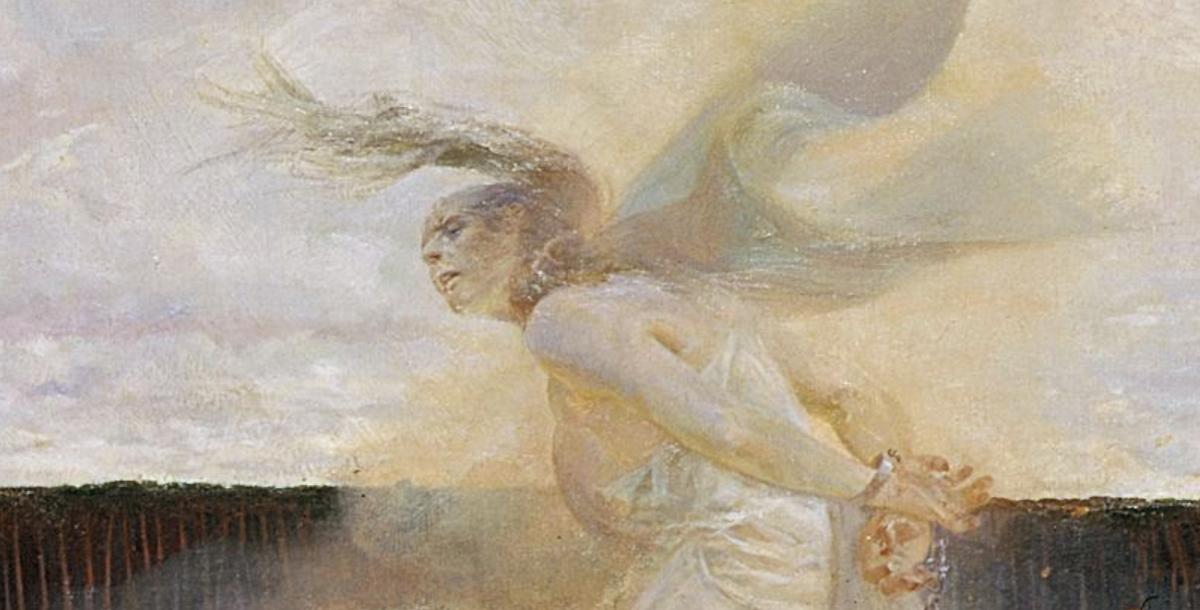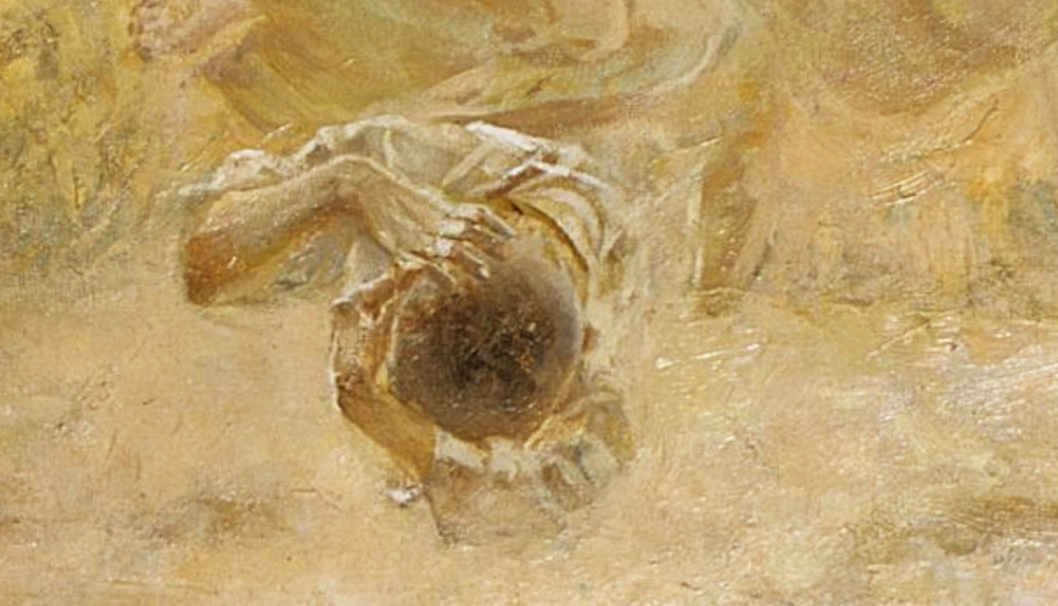March 6: Dust We Are
♫ Music:
WEEK ONE
WE WILL ALL DIE
March 6 - March 9
Death is the one thing that all human beings have in common, the one thing that has been the case since the beginning of time. We will all eventually die and return to the earth. “Dust you are and to dust you shall return.” Christians believe that at death our bodies are reduced to clay, but that our spirits become God’s intended, complete creations. Christ reveals to the world what it is to be God by dying a human death, the only thing all humanity shares. This selfless, humiliating act unites Christ with every human being who has walked the earth. Rev. John Behr states “Mortality is not a property of God, creating life is not a property of humans, but Christ has brought both together, conquering death by his death and in this very act conferring life immortal. He enables all men and women to use their own mortality to come to life in him.”
ASH WEDNESDAY
Wednesday, March 6
Dust We Are
Scripture: Genesis 3:19
By the sweat of your face you shall eat bread, till you return to the ground, for out of it you were taken; for you are dust, and to dust you shall return.
Poetry:
Dust
by Dorianne Laux
Someone spoke to me last night,
told me the truth. Just a few words,
but I recognized it.
I knew I should make myself get up,
write it down, but it was late,
and I was exhausted from working
all day in the garden, moving rocks.
Now, I remember only the flavor —
not like food, sweet or sharp.
More like a fine powder, like dust.
And I wasn’t elated or frightened,
but simply rapt, aware.
That’s how it is sometimes —
God comes to your window,
all bright light and black wings,
and you’re just too tired to open it.
DUST WE ARE
After committing the first sin, did Adam and Eve wait with bated breath, anticipating what God might say to them in response to their transgression? Did they hang their heads low in shame, wondering what would happen next? Were they prepared to hear God’s judgment that due to their sin they would now die? Did they even know what death was? “By the sweat of your face you shall eat bread, till you return to the ground, for out of it you were taken; for you are dust, and to dust you shall return” (Genesis 3:19). Is there a more haunting phrase in all of the Scriptures? (This hauntingness is captured so well in Paschburg’s “Sand Whirling” and Malczewski’s “The Dust Storm”). Could there be a more portentous prophecy? Perhaps not, for all subsequent words of hope from the mouth of God as recorded in his Word must be read in light of this ill-boding judgment. From whence comes hope if not from such profound humility? Dust we are.
And today, especially today, we must live into the depth of this mortal decree, having ashes smeared on our foreheads as God’s minister reminds us that we are nothing more than dust. Dust – that ever-present and bothersome gritty waste that serves no purpose, it seems, than to muck up our furniture and floors. I came from dust, I constantly clean away the dust, and one day I will return to dust. That is the message of Ash Wednesday – Almighty God, you have created us out of the dust of the earth: Grant these ashes may be to us a sign of our mortality….
Yet today is not just about our mortality but it is a day of repentance – Grant these ashes may be to us a sign of our mortality and penitence…. God we have not loved you with our whole heart, mind and strength… We have not loved our neighbors as ourselves… We have been deaf to your call to serve… We have grieved your Holy Spirit… We confess our past unfaithfulness: the pride, hypocrisy, and impatience of our lives… We confess our self-indulgent appetites and ways… We confess our intemperate love of worldly goods and comforts… We confess our negligence in prayer and worship, our failure to commend the faith that is in us, our blindness to human need and suffering, our prejudice and contempt toward those who differ from us, our….
Restore us, good Lord… Accomplish in us the work of your salvation.. Accept our repentance, O Lord.
Prayer:
Almighty and everlasting God, you hate nothing you have made and forgive the sins of all who are penitent: Create and make in us new and contrite hearts, that we, worthily lamenting our sins and acknowledging our wretchedness, may obtain of you, the God of all mercy, perfect remission and forgiveness; through Jesus Christ our Lord, who lives and reigns with you and the Holy Spirit, one God, for ever and ever.
Amen.
(Collect for Ash Wednesday, BCP 1979)
Dr. Greg Peters
Associate Professor
Torrey Honors Institute
Biola University
For more information about the artwork, music, and poetry selected for this day, we have provided resources under the “About” tab located next to the “Devotional” tab.
About the Artwork:
The Dust Storm, 1893-1894 (3 views)
Jacek Malczewski
Oil on canvas
78 x 150 cm
Muzeum Nardowe w Pozaniu, Poland
The Dust Storm, rarely seen outside its home in Poland, was exhibited in 2013 with a group of Symbolist paintings at The National Gallery of Scotland. The exhibition brought together more than 70 diverse works from across Europe and explored the development of painting from representational work towards abstraction and surrealism via the broad movement of Symbolism. Although the central figure of this painting by Malczewski depicts Poland being assailed by Russia, it elicits a broader sense of struggle between life and death. The painting brings heaven and earth together as symbolized in the face of the lowest figure in the dust and the clothes of the upper figure becoming like angel wings.
About the Artist:
Jacek Malczewski (1854-1929) was a Polish painter associated with the patriotic Young Poland Movement and is regarded as the father of Polish Symbolism. Malczewski combined the predominant style of his time with historical motifs of Polish martyrdom, the Romantic ideals of independence, Christian and Greek traditions, folk mythology, and the natural environment. Between 1885 and 1916, Malczewski regularly visited Paris, Munich, Vienna, Italy, Greece, and Turkey where he drew inspiration from a wide variety of sources and then translated these themes back into Polish folklore, tradition, and motifs within his own paintings. Many of his paintings prominently feature his own self-portrait in elaborate costumes. Between 1897-1900 and 1912-1921, Malczewski served as a Professor of the Academy of Fine Arts in Kraków. His art has been compared to that of Gustave Moreau, Arnold Böcklin, and even Salvador Dalí.
About the Music:
“Sand Whirling” from the album Oceanic
About the Composer and Performer:
Niklas Paschburg (b. 1994) is a German composer whose mesmerizing music creates an almost cinematic atmosphere. To compose and record the album Oceanic, Paschburg decamped to the Baltic Sea. There he spent as much time as possible on the coast, taking in the mood, breathing in the sea air, listening to the constant flow of the waves and transposing it all into music. This period was a defining experience for the young German composer, whose sound is deeply influenced by today’s “neo-classical scene,” including composers such as Nils Frahm, Ólafur Arnalds, and Hauschka.
About the Poet:
Dorianne Laux (b. 1952) is an American poet and author of several collections of poetry, including What We Carry (1994), a finalist for the National Book Critics Circle Award; Smoke (2000); Facts about the Moon (2005), winner of the Oregon Book Award; The Book of Men (2011), which was awarded the Paterson Prize; and Only As the Day is Long: New and Selected Poems (2018). She has received fellowships from the Guggenheim Foundation and the National Endowment for the Arts, and has been a Pushcart Prize winner. Laux teaches poetry in the Program in Creative Writing at North Carolina State University and is a founding faculty member of Pacific University's Low Residency MFA Program. She lives in North Carolina with her husband, poet Joseph Millar.
About the Devotional Writer:
Dr. Greg Peters
Associate Professor
Torrey Honors Institute,
Biola University
Greg Peters is a native Virginian who loves to travel (especially in Europe) and read. When not reading for work, Greg reads for fun. He enjoys the fiction of Paul Auster, Bernard Malamud, Chinua Achebe and the nineteenth century Russian novelists. In addition, Greg loves the poetry of John Donne and George Herbert. When it comes to non-fiction, he enjoys reading anything that has to do with theology, monasticism or the history of the Christian church. When not working or reading Greg enjoys spending time with his wife Christina and their two sons: Brendan and Nathanael. In addition to being a professor at Torrey Honors Institute, Greg is an ordained pastor in the Anglican tradition, serving regularly in his local parish.


